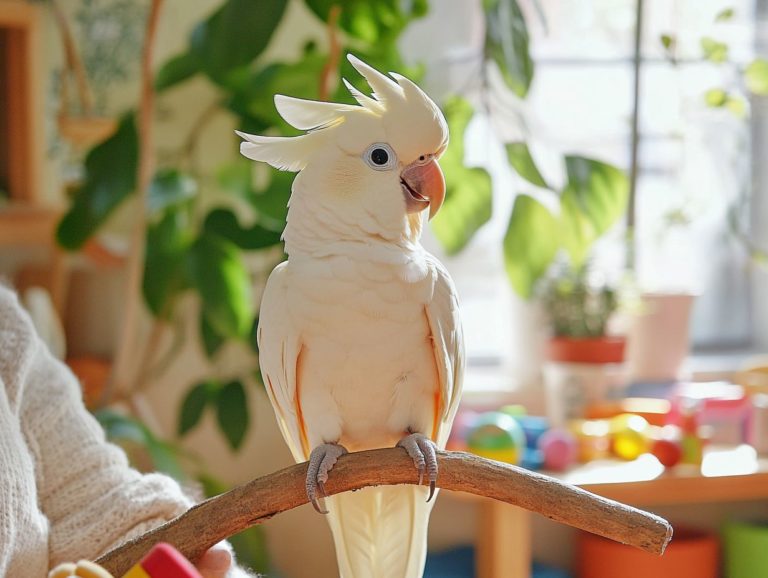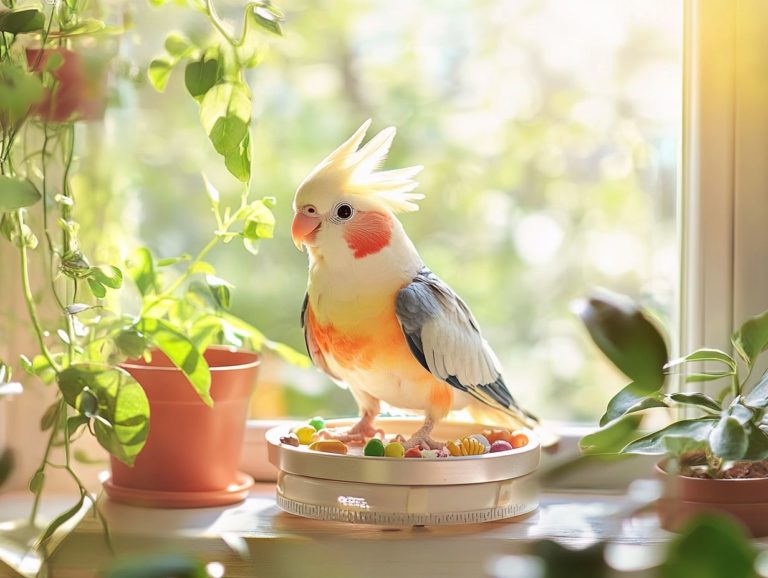Quaker Parrot: Unique Care Tips for a Unique Bird
Quaker parrots are captivating companions, known for their playful personalities and vibrant green feathers. They have unique needs that require your attention. This overview offers essential care tips on diet, exercise, and training.
You ll also discover common health issues, signs of illness to watch for, and ways to create an ideal environment for these delightful birds. Learn how to enhance the well-being of your Quaker parrot and deepen the bond you share with them.
Contents
Key Takeaways:
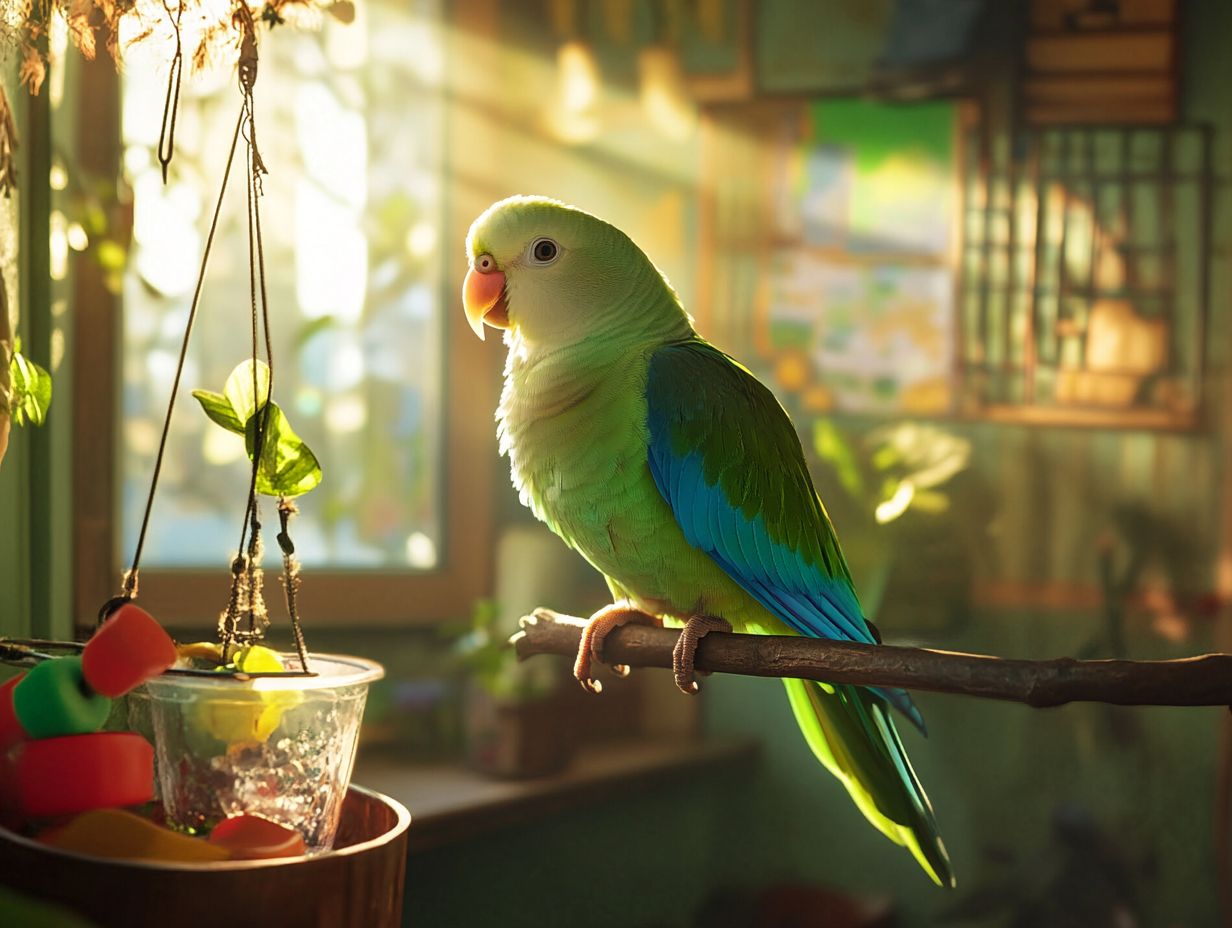
- Provide a varied and nutritious diet, avoiding avocado, chocolate, and caffeine.
- Ensure plenty of playtime and opportunities to fly.
- Use positive reinforcement techniques for training and socialization.
About Quaker Parrots
Quaker parrots, scientifically known as Myiopsitta monachus, are renowned for their charming and inquisitive nature. Their vibrant personalities make them an exceptional choice for pets.
Hailing from the lush landscapes of South America especially Argentina, Brazil, and Uruguay these delightful birds are popular as affectionate companions, captivating many with their playful curiosity.
Their penchant for social interaction and impressive ability to mimic sounds truly set them apart in the pet world, fostering a deep bond with their owners that can last for years.
Overview of Quaker Parrots
Quaker parrots, also known as Monk parakeets, are easily recognizable by their vibrant green feathers and remarkable bonding behaviors. You ll often find them thriving in urban environments, adapting effortlessly to household conditions.
These small, intelligent birds flourish in various habitats, from lush subtropical forests to open savannas. Their nesting habits are particularly noteworthy; they build large, communal nests that are an architectural feat, constructed from twigs and leaves, often perched high in trees or on utility poles.
While their sociable nature makes them endearing companions, it’s important to note that Quaker parrots can also be pests, frequently indulging in crops like corn and sunflowers. This duality as cherished pets and potential pests underscores their ecological significance and adaptability in changing landscapes.
Unique Care Tips for Quaker Parrots
Caring for a Quaker parrot is a rewarding journey that requires your commitment! You’ll need to provide a high-quality diet, engage them with mental stimulation, and ensure ample social interaction.
This dedication will allow them to flourish as vibrant and delightful companions in your home.
Diet and Nutrition
The diet of your Quaker parrot should be a carefully curated blend of seeds, pellets, fruits, and vegetables to ensure they receive the necessary nutrients for health and longevity.
A well-planned diet is crucial for their overall well-being, influencing everything from their energy levels to feather quality and even life expectancy.
Offer a balanced diet that includes:
- High-quality pellets
- Fresh fruits and vegetables
- Occasional nuts as treats
Including a variety of high-quality pellets provides a solid nutritional foundation, while fresh fruits and vegetables like leafy greens and vibrant berries offer important vitamins and minerals.
Occasional treats like nuts can be beneficial, but remember to offer them in moderation. It s also wise to consider food supplements to help fill any dietary gaps. Neglecting these vital elements can lead to not getting enough nutrients, obesity, and serious health issues for these lively companions.
Enrichment and Exercise
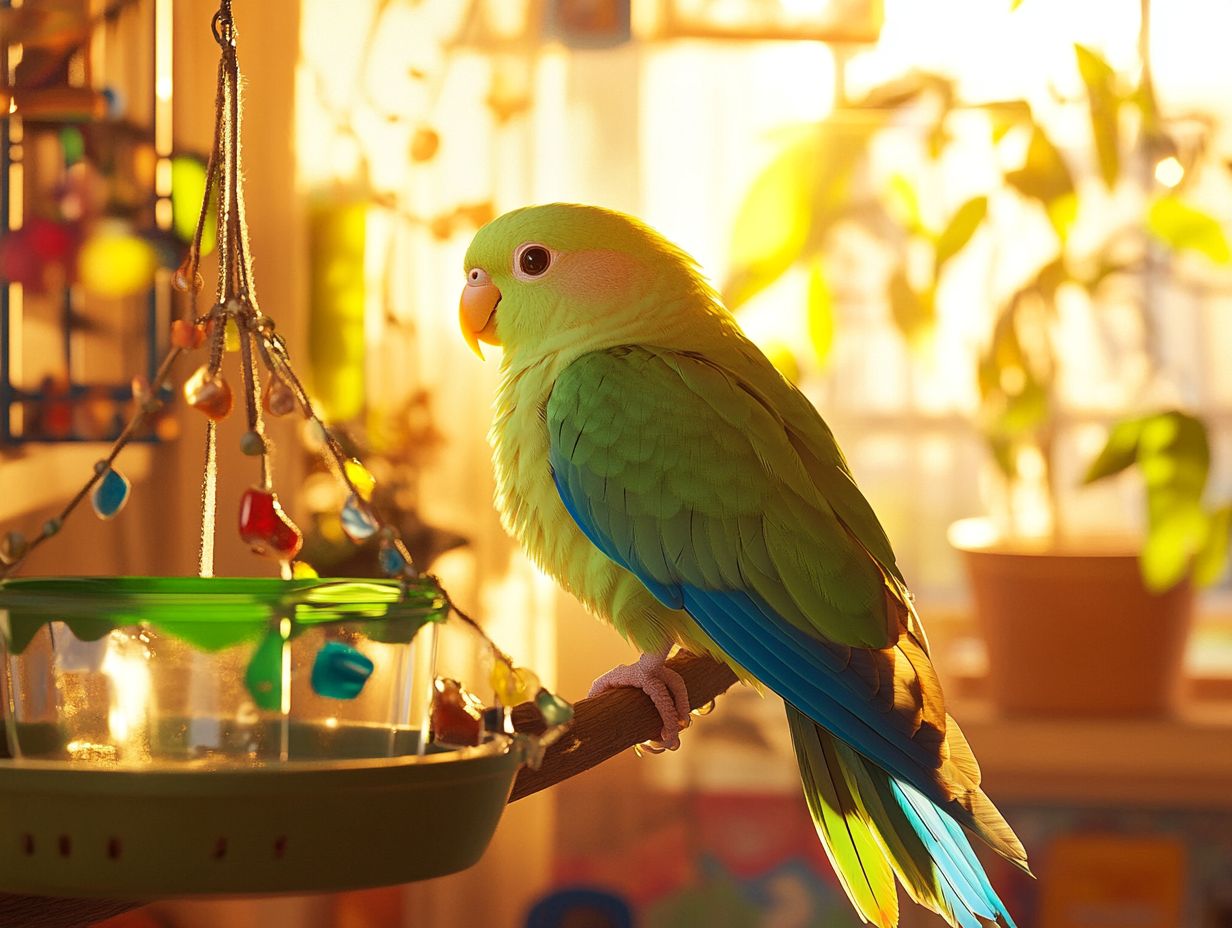
Providing mental stimulation and regular out-of-cage time is essential for Quaker parrots. Their naturally inquisitive nature thrives on interaction and exploration in a safe environment.
Engaging in a variety of enrichment activities can greatly enhance their quality of life. By incorporating interactive toys designed for these curious birds, you can stimulate their minds and offer them endless entertainment. They learn to solve puzzles and manipulate objects.
Social interaction adds another vital layer of enrichment. Whether with you or other pets, it fosters strong bonds and enhances their emotional well-being. Establishing structured playtime routines keeps them physically active and helps curb unwanted behaviors.
A well-rounded regimen filled with diverse activities ensures that these vibrant parrots remain both happy and healthy.
Behavior and Training
Quaker parrots are known for their intelligence and distinctive personalities. This makes them relatively easy to train, fostering strong bonding experiences between you and your pet.
Using effective training methods enhances their behavioral responses and stimulates their mental faculties. Rewarding good behavior through treats or praise is crucial. Engaging in activities like interactive play and gentle socialization can deepen the emotional connection between you and your bird.
Consistency in training is essential. Dedicating time each day for practice cultivates a sense of trust. Your Quaker parrot will feel secure in its environment.
These strategies create a well-adjusted and intellectually enriched companion.
Health Concerns for Quaker Parrots
Understanding common health issues that affect Quaker parrots is vital for their well-being. Regular veterinary check-ups are essential for responsible pet ownership.
Prioritizing their health is key to nurturing a happy and thriving companion.
Common Health Issues
Common health issues in Quaker parrots often include feather plucking, behavioral problems, and nutritional deficiencies. These are typically linked to their emotional well-being and environmental conditions.
These challenges affect their physical health and may signal underlying stress or anxiety. For example, feather plucking is often a reaction to boredom or insufficient social interaction. Behavioral problems like screaming or aggression can arise from disruptions in their routine or a lack of stimulation.
Nutritional deficiencies, such as not getting enough vitamins and minerals, can occur when their diet lacks variety. This leads to potential health complications.
To tackle these issues, create a stable environment with engaging toys. A balanced diet filled with fresh fruits and vegetables is essential. Regular social interaction plays a significant role as well. Emotional support through gentle handling and a consistent routine fosters a sense of security. This can enhance their overall health and happiness.
Signs of Illness
Recognizing signs of illness in your Quaker parrot is essential for timely intervention. If you notice changes in appetite, lethargy, or unusual vocalizations, schedule a veterinary check-up.
A decrease in activity levels, feather plucking, or changes in droppings can indicate underlying health issues. By closely monitoring their behavior, you can detect these crucial signs early.
Watch for fluctuations in weight and shifts in social engagement. The mental well-being of your Quaker parrot often reflects their physical health.
If your bird shows signs of distress or engages in excessive preening, these could be red flags for potential illness. Regular check-ups are vital to ensure any health concerns are addressed promptly. This leads to a happier, healthier companion.
Caring for Your Quaker Parrot: Unique Needs for a Happy Life
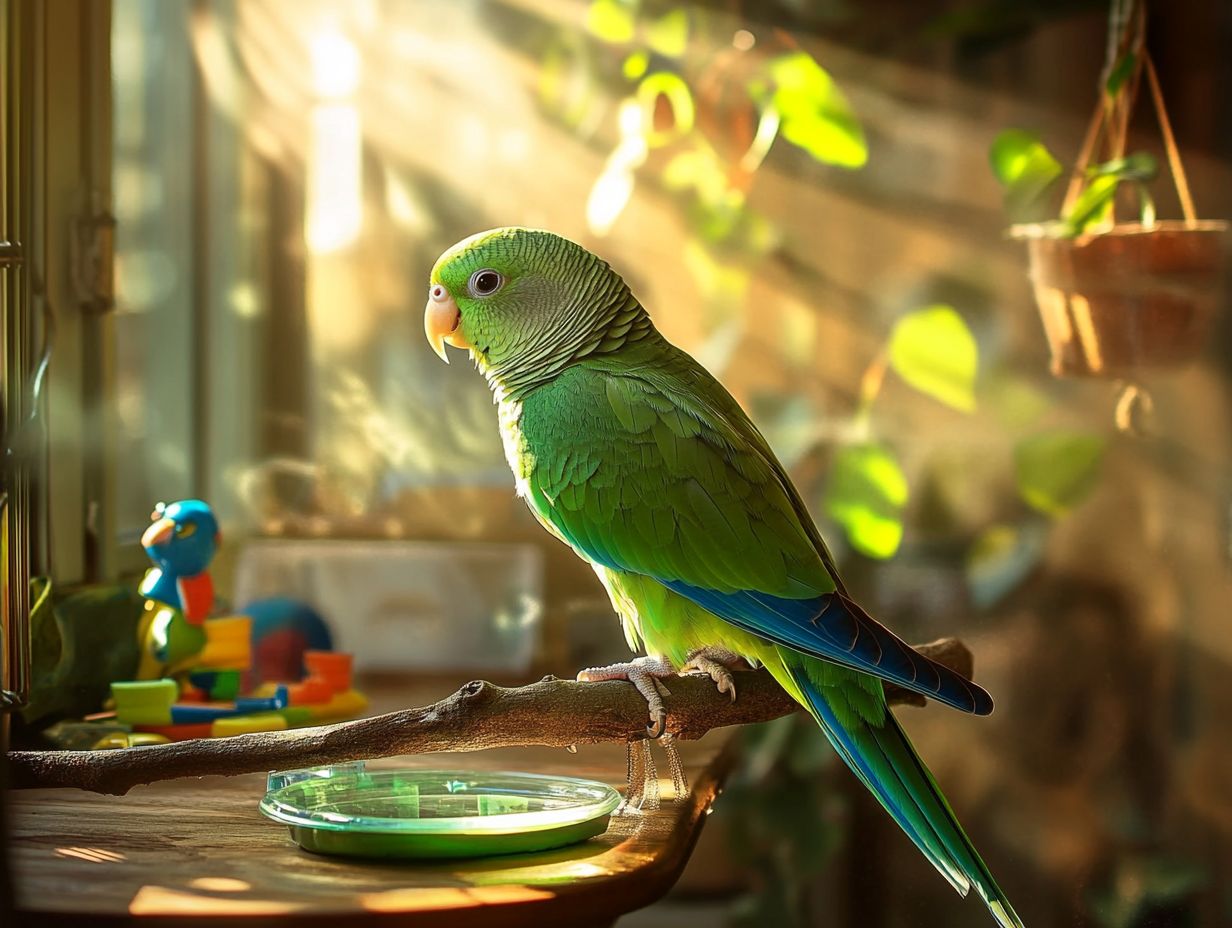
Meeting the unique needs of Quaker parrots demands a strong commitment to care. This includes ensuring they have suitable housing, encouraging social interaction, and gaining a deep understanding of their behavioral tendencies as they adapt to your household environment.
Creating the Ideal Environment
Creating the ideal environment for your Quaker parrot begins with a deep understanding of their housing needs. Cleanliness and safety should take precedence in their living space.
To achieve this, consider the dimensions of the cage; a spacious home invites movement and exploration, which are essential for their physical and mental well-being. Position the cage in a secure, well-lit area away from drafts and direct sunlight to enhance your parrot’s comfort and happiness.
Incorporating environmental features like perches with varying textures and sizes, along with engaging toys to spark their curiosity, is vital for encouraging natural behaviors.
Regular cleaning is equally important, not just for hygiene, but for fostering a stress-free habitat that supports a healthy lifestyle. This allows these vibrant birds to truly thrive.
Addressing Behavioral Issues
Addressing behavioral issues in Quaker parrots requires you to understand their emotional needs and implement effective training methods that promote positive behaviors. Caring for these intelligent creatures means recognizing that their well-being hinges on a stable environment and emotional support.
You might encounter common challenges like aggression or anxiety, but these can be managed with consistent and gentle training strategies. One highly effective approach is to establish a routine that instills a sense of security in your parrot, combined with rewarding good behavior with treats or affection.
Providing a variety of stimulating toys helps alleviate boredom and anxiety, nurturing a more harmonious relationship between you and your feathered friend.
Frequently Asked Questions
Why are Quaker Parrots so special compared to other birds?
Quaker Parrots, also known as Monk Parakeets, have the ability to mimic human speech and are known for their playful and social personalities.
How should I house my Quaker Parrot?
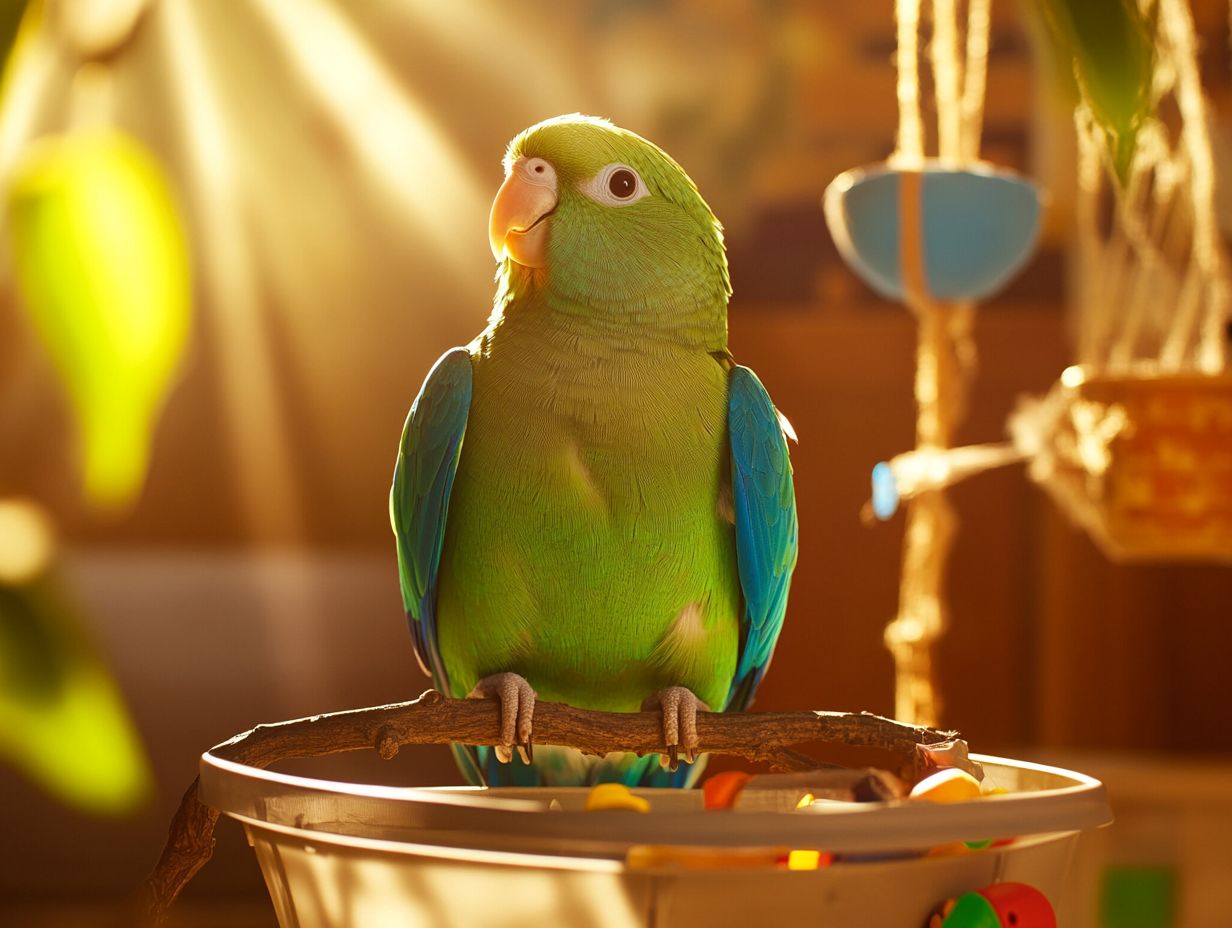
Quaker Parrots require a spacious and stimulating environment, such as a large cage with plenty of toys and perches. They also thrive in pairs or small groups, so consider getting more than one if possible.
What kind of diet should I provide for my Quaker Parrot?
Quaker Parrots should be fed a balanced diet of seeds, pellets, fresh fruits, vegetables, and occasional treats. It is important to avoid high-fat and sugary foods, as well as avocado and chocolate, which can be toxic to birds.
Do Quaker Parrots need any special grooming or care?
Quaker Parrots naturally groom themselves, but it is important to provide them with a shallow dish of water for bathing and to trim their nails and wings regularly to prevent injury and escape.
How do I handle my Quaker Parrot?
Quaker Parrots are social birds and enjoy interactions with their owners. It is essential to handle them gently and regularly to build trust and create a strong bond. Avoid sudden movements and never grab them by their feathers.
What are some potential health concerns for Quaker Parrots?
Quaker Parrots are generally hardy birds, but they can develop respiratory infections, feather plucking, and other health issues. It is important to provide them with a clean environment, regular check-ups with an avian vet, and a balanced diet to prevent these issues.
Your Quaker parrot deserves a safe and stimulating space to thrive! Start creating a loving home for your Quaker parrot today!

